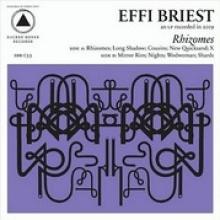Psychic Ills issued two of the better full length albums springing from the first decade of the new millennium. Dins should easily be figured as the stronger release. And where the following Mirror Eye was and expansion on some of the spacier, ambient moments from that first disc, it still counts as a stand up, if not willfully trippy, rock act by a band attempting to mine the depths of ambient music.
That album – and it’s bassist Elizabeth Hart – should rightly be considered the precussor to what Effi Briest has become. It doesn’t even matter that Hart wasn’t the impetus for the project, but her contributions as well as the back catalog she’s associated with informs Rhizomes to the fullest.
With disco, dance and post-punk all contributing to the foundation of first long player from Effi Briest – although there were a few Euro singles preceding it – lauding those Psychic Ills releases might seem out of place. But what recordings from both groups do is to create a pretty heavy handed atmosphere with relatively minimal ingredients. Effi Briest, though, counts six people in its line up. And while that’s pretty endlessly confusing after taking a listen to the album (what are all those people even doing), the approach concludes in a release that’s sure to ingratiate itself to those enamored of punk and dance music’s confluence.
Issued through Sacred Bones, an imprint seemingly flush with quality release, Rhizomes might be the most singular disc coming from the label. That, though, doesn’t mean it’s a great album (as a side, there’s a difference between my tastes and what’s set to be embraced by the underground cognoscenti. So, while I won’t ever toss this album on again, there are legions of people who are going to be instantly taken with the band).
Creating slinky backings for keyboardist and vocalist Kelsey Barrett to sing over isn’t a task that appears to be difficult for this huge ensemble. However, it’s the moments when the band goes at it all instrumental like which listeners are going to find the most rewarding. That’s not to figure Barrett for some hackneyed crooner – she’s not. But efforts like “X” so easily surpass the vocal cuts it’s worth a mention.
That shortest track on the album begins with a combination of ringing keyboard notes, a cave(wo)man drumbeat and eventually Hart’s simple bass line. Dub gets referenced while discussing the band pretty frequently. And while that’s not a bad way to describe the some of the rhythms spread out over the disc, Robbie Shakespeare was probably not at the forefront of anyone’s mind during the recording process. “X” goes on to move around in a noisome zone that doesn’t affix itself to a specific or memorable progression, groove or otherwise. The atmosphere it creates, though, is what makes it a tremendous listen, harkening back to the best moments from the Psychic Ills’ catalog.
Filling out the album are a spate of tracks tied to some Brit conception of dancey punk workouts – mutant disco being a touchstone as well. None of that stuff, though, comes close to the heights found during the brief two minutes comprising “X.” Bummer.
